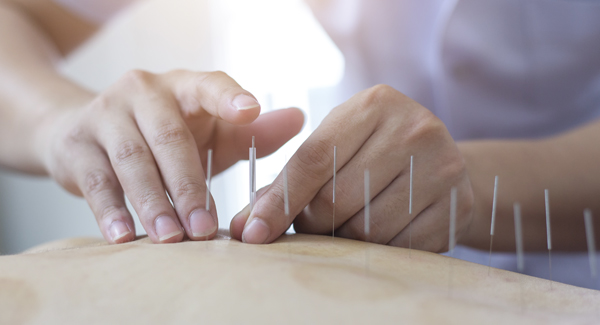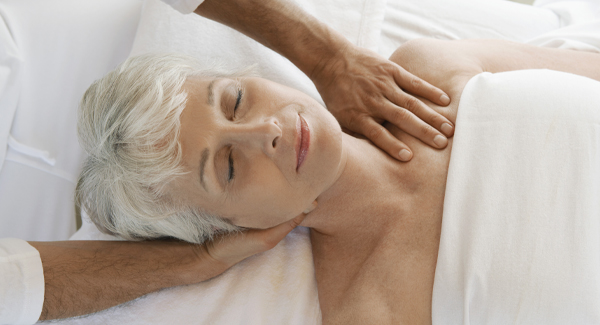Acupuncture for Arthritis
Studies haven’t confirmed acupuncture helps arthritis, but it still may be worth trying.
It’s been about 2,000 years in the making, but acupuncture has gained some mainstream acceptance as a medical modality. Research offers limited, but in some cases promising, evidence that acupuncture can help with arthritis symptoms.
The theory of acupuncture goes something like this: An essential life energy called qi (pronounced “chee”) flows through the body along 20 invisible channels called meridians. When the flow of this energy is blocked or out of balance, illness or pain results. More than 2,000 acupuncture points connect to the meridians. Stimulating those points with needles, it is said, will correct the flow of qi and alleviate pain.
How Acupuncture Affects Arthritis
Western medicine doesn’t recognize the concepts of qi and meridians. However, scientific evidence suggests alternate explanations for why acupuncture might provide pain relief.
“There’s a lot of research that says when we put an acupuncture needle into the body, a number of physiological mechanisms occurs,” says Brian Berman, MD, professor of family and community medicine and director of the Center for Integrative Medicine at the University of Maryland School of Medicine.
A well-placed needle sets off a cascade of events, Dr. Berman explains, producing a signal that travels along the spinal cord to the brain, triggering a release of neurotransmitters called endorphins and enkephalins, which scientists believe reduce the sensation of pain. Research also shows that inserting an acupuncture needle induces the production of cortisol, a hormone that helps control inflammation. Acupuncture may stimulate activity of other pain-relieving chemicals in the body as well.
But do all these biochemical changes relieve sore, stiff joints? A study by Dr. Berman and his colleagues found that after 26 weeks, patients receiving real acupuncture felt significantly less pain and functioned better (as measured by how far they could walk in six minutes) than their counterparts who received sham acupuncture.
What the Research Shows
Other studies haven’t been as positive, and acupuncture’s benefits have been hard to prove because high-quality studies on the subject of arthritis and acupuncture have been limited. Here’s a look at some of the recent research that has been done:
- Osteoarthritis. Even though patients offer anecdotal evidence that acupuncture has helped them, most studies have found acupuncture offers minimal pain and stiffness relief for osteoarthritis (OA). A 2018 Cochrane review of six studies evaluating acupuncture for hip OA concluded acupuncture probably has little or no effect in reducing pain or improving function compared to sham acupuncture in people with hip osteoarthritis. One unblinded trial found that acupuncture as an addition to routine primary physician care was associated with reduced pain and improved function. However, these reported benefits are likely due at least partially to participants' greater expectations that acupuncture can help.
- Rheumatoid Arthritis. Recent research suggests acupuncture may hold a beneficial role in treatment for some people with rheumatoid arthritis (RA). A review of 43 studies, conducted between 1974 and 2018 and reported in Evidence-based Complementary and Alternative Medicine, concluded that “acupuncture alone or combined with other treatment modalities is beneficial to the clinical conditions of RA and can improve function and quality of life, and is worth trying.” The review cites several possible ways acupuncture effects RA, including its anti-inflammatory effect, antioxidative effect and regulation of immune system function. However, the review acknowledges that there is still inconsistency among trial findings and that further research is needed to evaluate the effects of acupuncture and how it works.
- Fibromyalgia. In a 2014 review article in Journal of Traditional Chinese Medicine, researchers analyzed the results of nine studies on acupuncture for fibromyalgia. Though a few studies found acupuncture worked better than drugs to manage the condition, most of the studies weren’t well designed. The authors concluded there wasn’t enough evidence to prove acupuncture works better than placebo.
Just a Placebo Effect? It May Not Matter
Some experts question whether pain relief noted in the studies is real or the result of a placebo effect – patients feeling better simply as a result of having needles applied to their skin. In a 2012 meta-analysis of studies published in JAMA Internal Medicine, researchers found real acupuncture was more effective than placebo at treating chronic pain – but only slightly so; 50 percent of acupuncture patients said their pain improved by half or more compared to 42.5 percent of patients receiving placebo treatments.
Other doctors say that even if acupuncture’s benefits are largely due to a placebo effect, it still could be worth trying. Growing research suggests that fake needles and other placebos may prevent pain signals from reaching the brain and promote other biological changes that could relieve symptoms of osteoarthritis and other conditions.
“If I’m suffering chronic pain and someone offers me an intervention that will improve my symptoms, I’d be thinking, ‘Of course I want that,’” says Andrew L. Avins, MD, a clinical professor of medicine at the University of California, San Francisco. “If our ultimate goal is to help patients achieve their goals, the mechanism is not all that relevant.”
How to Try Acupuncture
How much of a benefit you receive may depend on the severity of your arthritis, and how often you get treated, Rhudy says. Yet multiple sessions may not be cost effective, considering that acupuncture prices can range from $75 to $200 per session. Before trying acupuncture, check to see if your insurance will cover part or all of the cost. Many U.S. insurers do provide some acupuncture coverage,” says C. James Dowden, executive administrator of the American Academy of Medical Acupuncture. “But what conditions they cover vary.”
In some states Medicaid will cover a limited number of acupuncture sessions for specific diagnoses as will some Medicare Advantage plans. Traditional Medicare, however, will not pay for acupuncture.
If you’d like to try acupuncture, it’s important to find a trained and experienced practitioner. Diplomates of acupuncture have at least four years of academic training at the master’s level, must pass rigorous exams and meet state licensing and continuing education requirements. Ask your doctor to recommend an acupuncturist or search for one on the National Certification Commission for Acupuncture and Oriental Medicine website.

Stay in the Know. Live in the Yes.
Get involved with the arthritis community. Tell us a little about yourself and, based on your interests, you’ll receive emails packed with the latest information and resources to live your best life and connect with others.



